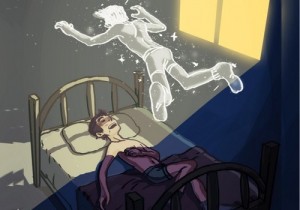It makes sense for people to assume that those who are blind cannot see in their dreams, or dream at all. This thought is commonly formed for multiple reasons. One common explanation behind this theory is that the blind individual cannot physically see, therefore, the blind individual’s brain is not used to the sense of sight as a whole and only recognizes the other senses that the body uses on a daily basis. Yes, the blind can dream. However, only some can see in their dreams.

According to an article in Sleep Medicine, a group of Danish researchers recruited 50 adults. Out of these 50, 11 of the participants were blind from birth, 14 went blind sometime after infancy, and there were 25 controls who were not blind.
Virginia Hughes from National Geographic reported that every individual in the control group has had a visual dream, as expected. However, none of the participants who were blind since birth have had a visual dream. The 14 participants who went blind after infancy stated that they do see, but the longer the length of time has been since they went blind decreases the strength of sight in their dreams.
The same study also reported by Melissa Pandika showed that approximately 18% of the blind individuals, from birth and later on in life, claimed they have tasted in at least one dream. Only 7% of the non-blind controls have reported to taste in their dreams. 30% of the blind claimed that they smell in at least one dream, in comparison to only half of those results. 70% of blind folks have reported a touch sensation, and 86% claim a hearing sensation.
Some refer to the blind in a collective manner, not realizing that every dream is dependent on the severity of the blindness. That being said, some that are blind are able to see. And those who cannot see depend on their other senses that have been strengthened over time to have vivid, lively dreams.
Sources:
http://phenomena.nationalgeographic.com/2014/02/26/how-the-blind-dream/
http://www.infociegos.com/english/index.php?option=com_content&task=view&id=14&Itemid=29
http://www.ozy.com/acumen/what-is-it-like-for-blind-people-to-dream/31902.article


Good point. I understand what point you are making, in the sense that the person recalling the dream may lack accuracy in remembering. However, we must remember in cases like this a survey or questionnaire is one of the only options that is readily available. It would clearly be immoral to make someone go blind and then ask if they recall a memory accurately, and for those who were born blind, well, that is honestly a lost cause as far as experimenting what memories they retain, if any. The accuracy in any survey is always questionable and can be based off of emotion for any participant.
Sorry if that part was unclear. According to what I found, one does not see in their dreams if they were never able to see from birth. The theory behind this is that they cannot see in their dreams at all because their brain is not used to the concept of sight whatsoever. They use the senses that their brain is familiar with — such as taste, touch, sound, and smell — to dream. I think that’s the interesting part of the theory; imagine dreaming with only sound for hours!
I think that while it makes sense that blind people who lost sight at infancy supposedly see in their dreams more than blind people who were born without sight, I question whether the study itself is valid enough. The study is based on self-reporting, which is not always an accurate measure in studies. Some people’s responses may be influenced by their emotions, for example someone who really wants to believe they saw in their dreams might start out by saying “I think I saw… yeah I saw something.”
Another problem is the ability to remember dreams. As we know, not everybody can remember their dreams. Why this is the case is confusing. In this article , two hypotheses are proposed: one, people who say they remember their dreams actually have a higher frequency of dreams per night and are only remember a few. Two, people who say they remember their dreams are lighter sleepers, meaning they wake up more in the night (even briefly) and so they have time to store the dreams in their memory.
Regardless, only half of the people in this study were able to recall their dreams. If only half of the population can recall their dreams, then perhaps the study on “Do the Blind see in their dreams?” is unable to evaluate a lot of people, blind from birth or otherwise.
To think someone that isn’t able to see but is able to dream is definitely an abstract concept! The distinction between those who were born blind as opposed to those who weren’t is made very well, and helps convey how dreaming may vary between those who are visually impaired. Very interesting subject! However, i do have one question-how does one not see in their dreams? I didn’t quite understand that part.
This is so interesting because I have never thought about that before. For those blind since birth, they must think and daydream without visual images, too. I’m assuming that those blind from birth use voice as their way to identify other people, so I wonder how their hearing compares to someone who isn’t blind. I would think that they would have better hearing which could detect different voices and who they belong to a lot more easily.
Wow thinking about this topic is so crazy. This video of a blind man explaining what he sees is so interesting. He says he just sees either light or dark and doesn’t think of what he “sees” as black he just “sees” nothing. This other video is the same guy talking about dreams and he said the same thing about the other senses being how he dreams.